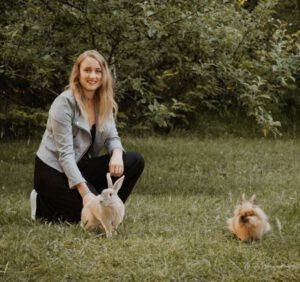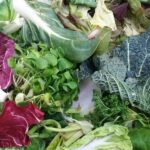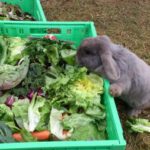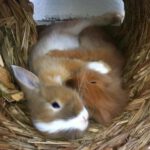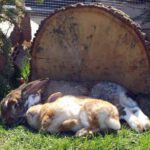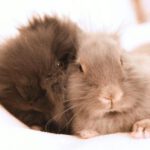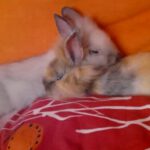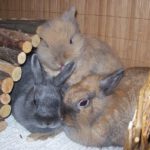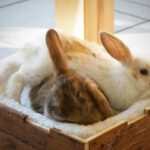Mushy or liquid poop
Warning! Rabbits with diarrhea often die within hours due to flystrike!
Contents
What causes diarrhea?
When a rabbit passes mushy or watery poop, it is referred to as diarrhea. This occurs due to irritation of the intestinal lining or, in later stages, due to an inflamed intestinal lining. The intestinal lining in rabbits becomes inflamed very quickly.
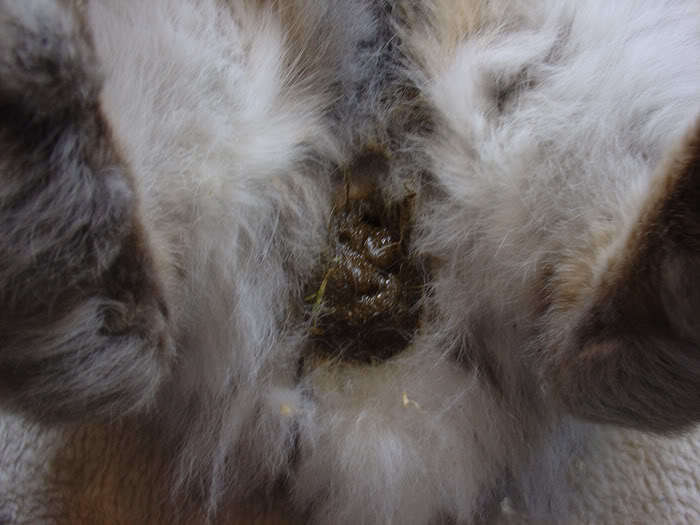
Home Remedies & First Aid
If diarrhea occurs once, for example, due to food intolerance or spoiled fresh food, home remedies can provide first aid and resolve the issue. Provided the rabbit is otherwise well, active, and eating normally, it is sufficient to offer high-quality greens (such as grass, carrot tops, celery leaves, aromatic herbs, branches with leaves) as well as oak leaves and bark. However, if the diarrhea does not clear up within 12 hours, recurs, or the rabbit stops eating or appears unwell, you must promptly consult a rabbit-savvy veterinarian!
Causes
The following causes are common:
- Poor nutrition:
For example, feeding dry food (including grain-free varieties), too much grain, sweets, treats, excessive root vegetables and fruit, or insufficient green forage. A common cause is the incorrect feeding of rabbits. Please take the time to thoroughly educate yourself on this page about the correct, dry-food-free diet! - Fresh Food Intolerance:
If your rabbit reacts to fresh food with diarrhea, there is always an underlying cause. Wild rabbits only eat fresh food, and our domestic rabbits have the same digestive system. If they can’t tolerate fresh food, they usually have parasites or are fed dry food, which damages their digestion to the point where they can no longer tolerate fresh food. Additionally, an overly dry diet (hay, dried herbs, dry food, dried vegetables, etc.) can lead to intolerances. If you eliminate everything dry except hay and instead feed exclusively good fresh greens (such as grass, branches, bitter greens, carrot tops, aromatic herbs) around the clock, the diarrhea should resolve. - Dried herbs/herb-rich hay: Rabbits may produce watery cecotropes, leave mushy poop, or sit in their mushy poop.
- Fresh greens in spring (especially protein-rich ones) can also cause diarrhea if they are not gradually introduced.
- Infections or parasites such as worms, coccidia, and yeast, as well as dysbiosis, can also cause issues. Have a poop sample from two to three consecutive days tested for yeast, coccidia, worms, and E. coli bacteria. If this doesn’t yield any results and other causes have been ruled out, a larger, more comprehensive poop sample is recommended.
- Increased strain due to unchewed food (dental problems or rapid eating because too little food is offered).
- Toxins that affect them (pesticide-contaminated or fermented fresh food, medications such as antibiotics, or toxic substances they have ingested).
- Sometimes, diarrhea is mistaken for cecal pellets, especially when they are flattened or smeared around the anus.
- A poop-covered bottom is not always caused by diarrhea; it is often due to cecotropes, or the rabbit may be unable to groom itself properly because it can’t reach (due to obesity) or is in pain (from conditions like arthritis, spondylosis, spinal issues, balance problems, etc.). In some cases, a very dirty environment can also be a contributing factor.
- White rabbits with pointed markings (pointed coloration) are often affected by megacolon, a congenital hereditary disease. These rabbits frequently experience mushy poop or diarrhea.
- Antibiotics can affect the digestive system and lead to diarrhea. Especially if they have been given for an extended period, the gut often remains sensitive for a while and may be prone to soft poop.
- Often, the gut flora is underdeveloped due to antibiotic use, improper feeding, or premature separation from the mother, or there may be dysbiosis (an imbalance in gut bacteria).
- Sensitive rabbits may respond to strong stress with soft poop.
- Some rabbits cannot tolerate certain types of vegetables and may react with diarrhea (intolerances, allergies).
- Many other underlying conditions (e.g., organ diseases, viruses, etc.) can also cause diarrhea. Therefore, if suspected, further investigations, especially a blood test, are necessary.
Important: Unlike in humans, diarrhea in rabbits is not harmless and always has an underlying medical cause! Be sure to find the cause and have the rabbit treated by a veterinarian.
Treatment: What helps with diarrhea?
Make sure to visit a veterinarian who specializes not just in small animals (dogs and cats) but specifically in exotic pets like rabbits and rodents! Only veterinarians with specialized training can effectively treat rabbits, as they are only briefly covered in standard veterinary education.
Diet During Diarrhea:
For mushy poop or mild diarrhea, a „diarrhea diet“ can often quickly resolve the issue. Temporarily feed only a variety of fresh greens and hay. Ideally, provide fresh greens from nature, including plenty of wild and aromatic herbs, grasses, carrot tops, foliage, and fresh oak branches and leaves. Offer digestive tea (pure herbal tea!) to increase water intake and soothe the digestive system.
Under no circumstances should you feed only hay (a „hay diet“), as it contains too little water and nutrients, unnecessarily weakening the rabbit. Dr. Anja Ewringmann, DVM, states in „Clinical Symptoms in Rabbits“:
„Proper feeding during diarrheal diseases is extremely important therapeutically. […] A hay-and-water diet is not suitable to meet the needs of these animals.“
Identify the Cause!
It is crucial to identify the cause of diarrhea. If diarrhea occurs, it is essential to reevaluate your feeding practices and have a mixed poop sample collected over three days (from all animals in the group) tested by a veterinarian for yeast, coccidia, and worms (this costs around. If diarrhea occurs repeatedly, the rabbit must be thoroughly examined by a veterinarian for dental problems. If unsuitable or new food was given before the diarrhea, it should no longer be fed, as it could be the cause.
When to See a Veterinarian Immediately?
If the diarrhea lasts longer than a day, or if the rabbit appears lethargic, refuses to eat, or shows any other unusual behavior, you should visit a veterinarian immediately (emergency services). In such cases, the rabbit’s life is at risk. Rabbits can quickly become dehydrated from diarrhea, which can lead to circulatory failure and, ultimately, death.
What Does the Veterinarian Do?
The veterinarian stabilizes the rabbit’s circulation (with IV fluids) and administers medications to treat the diarrhea. Supportive medications include Dysticum, and Stullmisan vet. powder. For diarrhea caused by antibiotics or other toxins, activated charcoal (available at pharmacies or online) or medicinal charcoal, as well as healing clay, may be used. To restore gut health, supplements like brewer’s yeast, apple pectin, or prebiotics/probiotics can be helpful.
Primarily, the diarrhea is treated by addressing its underlying cause. In cases of acute diarrhea accompanied by circulatory problems, rabbits often need to stay at the veterinarian’s clinic. They receive IV fluids and are closely monitored.
Care Measures
A rabbit with diarrhea requires careful attention and regular monitoring. It is essential to clean or trim away any feces from the fur once or twice daily and ensure the area around the anus remains clean. A veterinarian can shave the area for easier maintenance. Full washing should be minimized or done sparingly, as it can irritate the skin and cause inflammation. In some cases, gently wiping the area with a baby wipe or a damp cloth may suffice; in others, the rabbit’s hindquarters may need to be placed in a bowl of lukewarm water to soften and remove stuck-on feces.
During the summer, rabbits with diarrhea must be moved indoors until they recover, as they are at high risk for flystrike. Even indoors, flies can still pose a danger, so the area around the anus must be carefully checked for fly larvae twice a day.
Rabbits with diarrhea have an increased need for minerals. It is important to provide a Himalayan salt lick or a bowl of saline solution alongside their water (never as a replacement for it).
Special Section:Mushy/Liquid Cecotropes
This is often mistaken for diarrhea!
Soft Feces (Cecotropes)
Cecotropes are generally much softer than regular poops and can sometimes smear. For various reasons, they may not be consumed by the rabbit, leading to them sitting on it or smearing it around the enclosure. The causes can often be identified through urine and poop analysis.
Diarrhea
However, there are also rabbits that produce completely liquid or mushy cecotropes. Unlike true diarrhea, these rabbits also pass regular poops! Many owners report a constant alternation between mushy poops/diarrhea and normal poops.
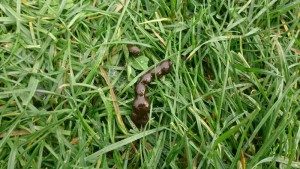
Liquid cecotropes in their intact form
The cause of mushy or liquid cecotropes is a condition affecting the cecum, often due to a bacterial imbalance. This issue usually arises from dysentery or another underlying condition, such as parasites (coccidia, worms) or spoiled food.
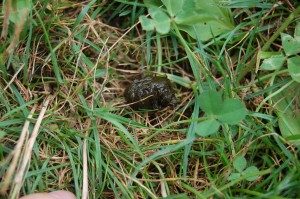
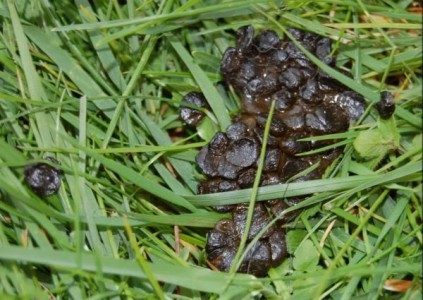
Despite extensive tests, no cause for Willy’s „diarrhea“-covered bottom could be found. Despite optimal nutrition and various treatment attempts, there was no improvement. „He’s completely covered every day, and the clinic never finds anything. Sometimes it’s so bad that when I’m at work and come home in the afternoon, everything has already dried and clogged up, preventing any poops from coming out. When I clean him, about ten poops come out at once, which is really awful.“. Thanks to our suggestion, the owner realized it might be cecotropes and that an inflammation could be the underlying cause. She treated with Baytril and Lactulose, and the rabbit recovered.
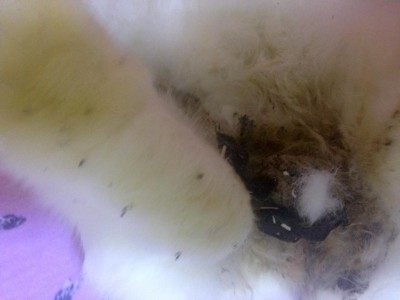
The issue usually arises from dysentery or another underlying condition, such as parasites (e.g., coccidia, worms), spoiled or unsuitable food, a generally poor diet (e.g., dry food), or significant stress. Yeast infections can also be a cause. The rabbits show no signs of pain and generally appear to be in good overall health. However, the most common cause is hay rich in herbs or dried herbs.
For dysentery, treatment is typically with Baytril (usually for 10 days, or longer if the symptoms persist, extending beyond recovery; in rabbits that have been untreated for a long time, treatment may need to be significantly longer to prevent recurrence). Parasites should be ruled out or treated through a poop test and a tape impression. A gut flora support supplement is necessary, with prebiotics proving particularly effective, sometimes in combination with probiotics.
Additionally, we recommend monitoring vitamin D intake, as a deficiency can promote or trigger inflammatory bowel diseases. Of course, the underlying cause should be addressed to prevent the condition from recurring.
Sources include:
Ewringmann, A. (2016): Leitsymptome beim Kaninchen: Diagnostischer Leitfaden und Therapie. Georg Thieme Verlag.
Hein, J. (2016): Durchfall beim Kaninchen–Ursachen und Therapie. kleintier konkret, 19(S 01), 2-9.
Hein, J. (2017): Durchfallerkrankungen bei Kleinsäugern: Ursache, Diagnostik, Therapie. Schlütersche.
Kraft, W., Emmerich, I. U., & Hein, J. (2012): Dosierungsvorschläge für Arzneimittel bei Kleinnagern, Kaninchen und Frettchen. Schattauer Verlag.


